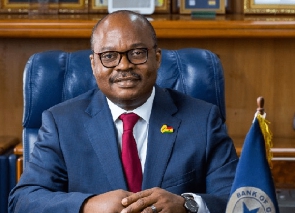The International Monetary Fund (IMF) has been urged to consider increasing concessional financing to Africa and also relax the eligibility criteria for Poverty Reduction and Growth Trust resources.
The Governor of the Bank of Ghana, Dr Ernest Addison, who made the call during the 2023 Africa Consultative Group Meeting with the Managing Director of the IMF, Kristalina Georgieva, Washington DC, U.S.A, said that would ensure timely financing assistance to most vulnerable members.
The meeting was on the theme “Addressing debt challenges and enhancing debt management to improve access to finance in Africa”.
The Governor said the improvement in IMF’s lending framework to enhance the continent’s access to Fund resources to address the fiscal challenges facing the continent would be critical in addressing the current debt challenge facing Africa in general and Ghana in particular.
“It is in this context we welcome the Fund’s decision to temporarily raise the annual and cumulative limits in the General Resources Account (GRA) to 200 per cent and 600 percent of quota respectively for a period of 12 months,” Dr Addison stated.
He stressed that the IMF should align the PRGT access limits with those of the GRA to enhance Fund support to PRGT-eligible members facing acute debt challenges, while strengthening the fundraising efforts to bolster the PRGT resource envelope.
Dr Addison stressed that the Fund should continue close engagements with other international financial institutions and creditors to strengthen the multilateral framework for dealing with Africa’s debt distress in a timely manner.
“In this context, the G20 Common Framework (CF) should be enhanced to deliver swift, predictable, transparent, and equitable debt resolutions, while permitting debt service suspension during negotiation to offer instantaneous relief to debtors,” the Governor stated.
He said a protracted CF process undermined overall confidence and impacted IMF’s catalytic role, in addition to its negative demonstration effect with new countries that are hesitant to request a CF debt treatment.
“We also underscore the need for the newly created Global Sovereign Debt Roundtable to remain focused on accelerating debt restructuring processes and making the G20 Common framework more efficient,” Dr Addison noted.
Dr Addison said African economies had accumulated debt at a rapid pace over the past decade just so they can be able to address developmental and infrastructural needs.
He said the continent’s debt structures had become more sophisticated, including bonds, loans, collateralised debt contracts and repurchase agreements, and the creditor base has become more diverse and fragmented.
Business News of Sunday, 23 April 2023
Source: ghanaiantimes.com.gh













